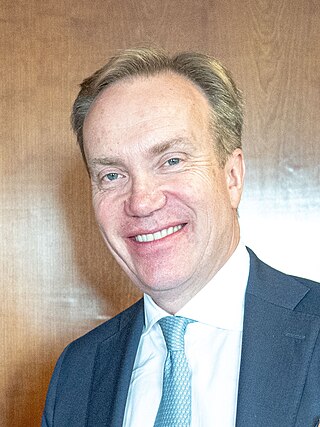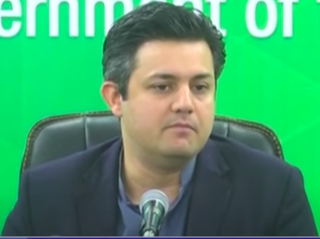Related Research Articles

The Politics of Pakistan takes place within the framework established by the constitution. The country is a federal parliamentary republic in which provincial governments enjoy a high degree of autonomy and residuary powers. Executive power is vested with the national cabinet which is headed by Prime Minister of Pakistan, who works with the bicameral parliament and the judiciary. Stipulations set by the constitution provide a delicate check and balance of sharing powers between executive, legislative, and judicial branches of the government.

The Shanghai Cooperation Organisation (SCO) is a Eurasian political, economic, international security and defence organization established by China and Russia in 2001. It is the world's largest regional organization in terms of geographic scope and population, covering approximately 80% of the area of Eurasia and 40% of the world population. As of 2021, its combined GDP was around 20% of global GDP.

The Economic Cooperation Organization or ECO is an Eurasian political and economic intergovernmental organization that was founded in 1985 in Tehran by the leaders of Iran, Pakistan, and Turkey. It provides a platform to discuss ways to improve development and promote trade and investment opportunities. The ECO is an ad hoc organisation under the United Nations Charter. The objective is to establish a single market for goods and services, much like the European Union. After the dissolution of the Soviet Union, the ECO expanded to include Afghanistan, Azerbaijan, Kazakhstan, Kyrgyzstan, Tajikistan, Turkmenistan, and Uzbekistan in 1992.

Børge Brende is a Norwegian politician and diplomat, and has been the president of the World Economic Forum since 2017. A member of the Conservative Party, he previously was Minister of Foreign Affairs from 2013 to 2017, Minister of the Environment from 2001 to 2004 and Minister of Trade and Industry from 2004 to 2005. He was also a member of the Norwegian Parliament from Sør-Trøndelag between 1997 and 2009.

The D-8 Organization for Economic Cooperation, also known as Developing-8, is an organisation for development co-operation among the following countries: Bangladesh, Egypt, Indonesia, Iran, Malaysia, Nigeria, Pakistan, and Turkey. The objectives of D-8 Organization for Economic Cooperation are to improve member states' position in the global economy, diversify and create new opportunities in trade relations, enhance participation in decision-making at international level, and improve standards of living. D-8 is a global arrangement rather than a regional one, as the composition of its members reflects. Organization for Economic Cooperation (D-8) is a forum with no adverse impact on bilateral and multilateral commitments of the member countries, emanating from their membership to other international or regional organizations.

The United Nations Permanent Forum on Indigenous Issues is the UN's central coordinating body for matters relating to the concerns and rights of the world's indigenous peoples. There are more than 370 million indigenous people in some 70 countries worldwide.

Shyam Saran is an Indian career diplomat. He joined the Indian Foreign Service in 1970 and rose to become the Foreign Secretary to the Government of India. Prior to his appointment as the Foreign Secretary he served as India's ambassador to Myanmar, Indonesia and Nepal and as its High Commissioner to Mauritius. Upon finishing his tenure as the Foreign Secretary, he was appointed the Prime Minister's Special Envoy for Indo-US Civil Nuclear Issues and later as Special Envoy and Chief Negotiator on Climate Change.

The Economic Coordination Committee, is a principle federal institution and a consultative forum used by the people-elected Prime Minister of Pakistan as its chairman, for concerning matters of state's economic security, geoeconomic, political economic and financial endowment issues. Although it is often chaired by the Finance Minister and the senior economic officials as its members on multiple occasions, the key executive authorization on key economic policies are made by the Prime Minister of Pakistan who reserves the right call upon and serves as the chairman of the ECC.

Seyed Mohammad Hossein Adeli is an Iranian politician, diplomat, economist and academic. He was the Secretary General of the Gas Exporting Countries Forum from 2014 until 2018. He is the founder of Ravand Institute. He was the chairman of Iran's first Investment Bank Amin Investment Bank until 2011. In May 2014, he received the Order of the Rising Sun from the Emperor of Japan, Akihito, the highest Order given to any Iranian National for his important role in the Iran–Japan relations.

Adil Najam is a Pakistani academic who also serves as the global President of WWF, the Worldwide Fund for Nature, and is Dean Emerıtus and Professor of International Relations and Earth and Environment at the Pardee School of Global Studies at Boston University. He was the founding Dean of the Pardee School from its creation in 2014 until 2022, when he was awarded the status of Dean Emeritus by Boston University. Previously he had served as vice-chancellor of the LUMS ın Lahore, Pakıstan.

Germany–Pakistan relations are the bilateral relations between the Federal Republic of Germany and the Islamic Republic of Pakistan. The two states established diplomatic relations in the 1950s, with a focus on social, educational and economic development. Despite strong co-operation and historical ties, the two nations have experienced growing tensions, primarily due to disagreements and differing policies regarding the War in Afghanistan, including as the post-2014 drawdown and 2021 withdrawal of United States-led coalition troops. Germany remains one of Pakistan's largest trading partners.
National Economic Council may refer to:

Sartaj Aziz was a Pakistani economist and strategist, who had previously served as the deputy chairman of the Planning Commission of Pakistan, member of the federal cabinet as the de facto Minister for Foreign Affairs, a Federal Senator as well as the National Security Advisor.
Mosharraf Zaidi is a Pakistani writer who writes a weekly column for The News International. Previously, he served as a Policy Advisor to the Ministry of Foreign Affairs between 2011 and 2013 under Hina Rabbani Khar, the former Foreign Minister of Pakistan.

The Bangladesh, China, India and Myanmar Economic Corridor (BCIM) was a proposed corridor connecting India and China through Myanmar and Bangladesh as a corridor.

The Cabinet Committee on National Security (CCNS or C2NS), (Urdu: کابینہ کمیٹی قومی سلامتی) previously known as the Defence Committee of Cabinet, is the principal federal institution and consultative forum used by the people-elected Prime Minister of Pakistan for concerning matters of state's national security, geopolitical, geostrategic, and foreign policy matters with the Prime minister's chief military advisers, senior government advisers and senior Cabinet ministers.
The Ministry of Economic Affairs, is a Cabinet-level ministry of the Government of Pakistan responsible for assessing, programming and negotiations of external economic assistance concerning the government and its constituent units from foreign governments and multilateral agencies.

Saadia Zahidi is a managing director at the World Economic Forum.

Muhammad Hammad Azhar is a Pakistani politician from Pakistan Tehreek-e-Insaf. He was elected from NA-126 (Lahore-IV) in 2018 Pakistani general election and remained a member of National Assembly of Pakistan between August 2018 to January 2023. He served in various ministerial positions in Imran Khan ministry between 2018 and April 2022. He served as Energy Minister of Pakistan and Finance Minister of Pakistan between 16 April 2021 to 3 April 2022 and 29 March 2021 to 16 April 2021 respectively.
References
- ↑ "PAKISTAN DEVELOPMENT FORUM 2010". ead.gov.pk.